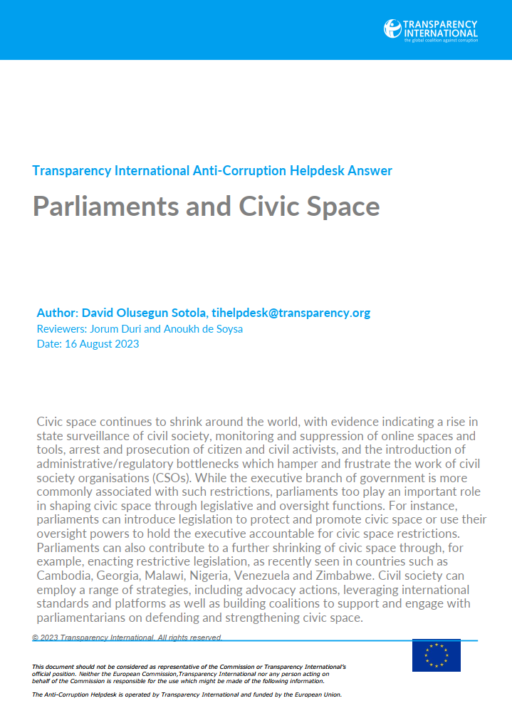
This Anti-Corruption Helpdesk brief was produced in response to a query from one of Transparency International’s national chapters. The Anti-Corruption Helpdesk is operated by Transparency International and funded by the European Union.
Query
Please provide an overview of the role played by parliaments in restricting and defending civic space, including some country examples preferably from the Global South
Summary
Civic space continues to shrink around the world, with evidence indicating a rise in state surveillance of civil society, monitoring and suppression of online spaces and tools, arrest and prosecution of citizen and civil activists, and the introduction of administrative/regulatory bottlenecks which hamper and frustrate the work of civil society organisations (CSOs). While the executive branch of government is more commonly associated with such restrictions, parliaments too play an important role in shaping civic space through legislative and oversight functions. For instance, parliaments can introduce legislation to protect and promote civic space or use their oversight powers to hold the executive accountable for civic space restrictions. Parliaments can also contribute to a further shrinking of civic space through, for example, enacting restrictive legislation, as recently seen in countries such as Cambodia, Georgia, Malawi, Nigeria, Venezuela and Zimbabwe. Civil society can employ a range of strategies, including advocacy actions, leveraging international standards and platforms as well as building coalitions to support and engage with parliamentarians on defending and strengthening civic space.
Contents
1. Introduction
2. International standards on protecting and promoting civic space
3. The role of the parliament in defending and expanding civic space
4. The role of the parliament in closing civic space
5. Strategies for CSOs to engage with parliament on civic space issues
6. Conclusion
Main points
- Parliaments contribute to closing civic space through enacting restrictive legislation, falling short of ratifying international treaties and conventions, and failing to hold governments to account for civic space restrictions.
- Parliamentary enactment of laws is particularly impactful on civic space because it can confer formal legitimacy and endorse civil repression.
- Parliaments can defend civic space through proactively legislating measures that strengthen civic space, rejecting restrictive bills, as well as in exercising oversight of government’s interactions with citizens and CSOs.
- Targeted advocacy and strategic engagement, along with raising awareness and building relevant capacity of parliamentarians are key ways to encourage parliaments to protect civic space.
Authors
David Olusegun Sotola, [email protected]
Reviewers
Jorum Duri and Anoukh de Soysa
Date
17/08/2023

